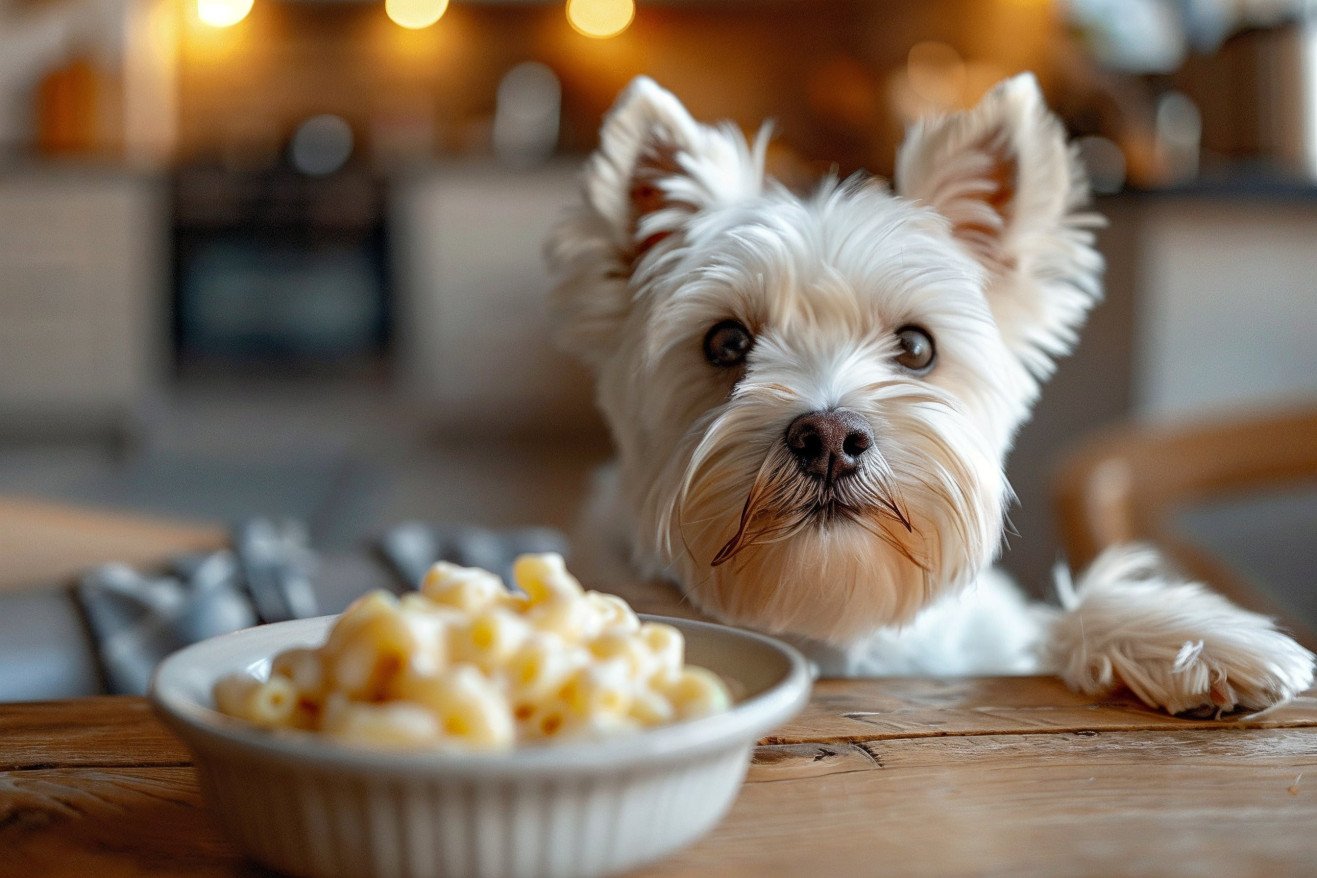Can Dogs Eat Mac and Cheese? A Vet-Backed Nutritional Breakdown
1 March 2024 • Updated 1 March 2024

Mac and cheese is a classic comfort food, but it’s probably not the best idea to share it with your dog. While there’s nothing inherently toxic to dogs in mac and cheese, veterinarians don’t recommend feeding it to dogs due to the high lactose content (which many dogs are lactose intolerant to) and the potential for digestive upset due to the high fat and sodium content.
As always, it’s important to talk to your vet before introducing human food into your dog’s diet.
This article will explore the science of veterinary medicine and dog nutrition to explain what happens when dogs eat mac and cheese. We’ll cover the dangers of dairy and high-fat foods, as well as what dogs need in their diet. By looking at a number of studies and expert insights, we hope to provide a well-rounded view of how these human foods impact dogs.
Can dogs eat mac and cheese?
Lactose Intolerance in Dogs
Even if you give your dog a small amount of dairy once in a while, it’s important to know that many dogs are lactose intolerant, which means they lack the enzyme lactase that’s needed to break down the lactose in milk in their digestive systems.
The American Kennel Club notes that the symptoms of lactose intolerance in dogs include diarrhea, vomiting, and loose stools—all of which are side effects that are definitely not worth the few seconds of joy your dog will get from eating a dairy-based treat like mac and cheese.
The lactose in a traditional mac and cheese recipe can be especially dangerous for dogs who are more sensitive to dairy. According to PetMD, some dogs can lose the ability to produce lactase as they get older, which can lead to digestive issues. Whole Dog Journal also notes that lactose intolerance in dogs can be indicated by symptoms like bloating and gas.
To make sure that lactose intolerance isn’t a problem, make sure to watch your dog for any signs of digestive issues after they eat dairy and ask your vet for advice. By knowing what to look for and how to treat it, you can make sure that your dog’s digestive system stays healthy and that they stay safe from the potential dangers of eating a food like mac and cheese.
Mac and Cheese Can Have Toxins for Dogs
Mac and cheese is more than just a delicious, cheesy meal; it can also contain ingredients that are toxic to our furry friends. For example, onion and garlic powder, which are often used to flavor mac and cheese, are toxic to dogs.
Hepper explains that these spices can cause damage to a dog’s red blood cells, which can lead to anemia. In addition, Spoiled Hounds notes that artificial flavors and colors, which are often added to highly processed mac and cheese, can cause stomach upset, leading to diarrhea or vomiting.
In fact, World Dog Finder notes that prepackaged mac and cheese contains phthalates, which are industrial chemicals that have been linked to cancer, at almost four times the recommended levels, in addition to these spices and additives. These chemicals, as well as the gluten found in the pasta, can cause dogs to have allergic reactions, which can lead to symptoms like loose stools and skin problems.
To make sure that your dog can continue to enjoy treats without any worry, opt for dog-safe snacks like carrots, green beans, or cooked lean meats, which can be a healthy alternative to this human food. Not only will these healthier options help you avoid the dangers of mac and cheese, but they will also be a positive addition to your dog’s diet.
Canine Nutritional Basics: More Than Just Mac and Cheese
Of course, one of the most important things to consider when it comes to your dog’s diet is that it’s nutritionally balanced. Proteins, fats, carbohydrates, vitamins, minerals, and water are the six basic nutrients that are important for optimal dog health, according to VCA Animal Hospitals.
These nutrients are important for things like energy, growth, repair, and immune function. That said, the nutritional content of mac and cheese doesn’t exactly meet the requirements of a nutritionally balanced diet.
Mac and cheese doesn’t contain the right balance of these nutrients for a dog, especially when you consider a dog’s age and activity level.
PetMD emphasizes the importance of ensuring your dog’s diet meets AAFCO guidelines, containing all essential nutrients. Mac and cheese is high in calories and low in nutrients, potentially leading to obesity and other health issues in dogs.
WebMD stresses the importance of feeding dogs regular, nutritionally balanced meals. It’s crucial to feed them a diet specifically formulated for dogs.
It’s important to make sure that the food you’re feeding your dog is contributing to their health, rather than feeding them things like mac and cheese that could be harmful.
Pros and Cons of Cheese for Dogs
The role of cheese in a dog’s diet is a delicate balance between reward and risk. According to PetMD, while cheese isn’t toxic to dogs, it can lead to gastrointestinal upset, especially in dogs that are lactose intolerant.
The American Kennel Club points out that the high fat content in cheese can lead to serious health problems, including obesity and pancreatitis. In dogs that are genetically predisposed to these issues, such as schnauzers and cocker spaniels, the fat in cheese may be more likely to cause problems.
That said, cheese can be helpful in moderation. Blue Cross recommends using small amounts of cheese as a high-value training reward. Low-fat cheeses, like cottage cheese or mozzarella, are less risky for dogs and can be used in small amounts as a treat or to hide pills.
In general, it’s important to use cheese in moderation. PetMD’s experts recommend that treats, including cheese, should make up no more than 10% of a dog’s daily calories. By choosing the right cheese and using it in the right amounts, you can use it to train your dog without putting their health at risk.
How to Feed Your Dog: Safe Practices for Dog Owners
When adding new foods to your dog’s diet, always do so in moderation and with care. The goal is to introduce new foods in small amounts and see how your dog reacts. If you see any signs of distress, like an upset stomach or a lack of energy, you should avoid that food in the future.
As A-Z Animals points out, these gastrointestinal issues can be caused by foods like mac and cheese, which are not good for a dog’s digestive system.
Instead of mac and cheese, you can feed your dog cooked vegetables like carrots or green beans, as well as lean meats. These options will give your dog the nutrients they need without the risks that come with high-fat, high-sugar foods. Hepper also notes that it’s important to make sure your dog is eating a consistent, balanced diet that doesn’t include human foods that can lead to weight gain and diabetes in dogs.
Make sure you’re seeing your vet on a regular basis to make sure that your dog’s diet is meeting their unique health needs. A diet that’s tailored to your dog’s needs can help prevent problems that come with eating the wrong foods and keep your dog as healthy as possible.
Working with your vet is the best way to make sure that you’re meeting your dog’s nutritional needs and making choices that are best for their health.
Conclusion: Can Dogs Eat Mac and Cheese?
While mac and cheese is a classic comfort food for people, it’s definitely not a good choice for dogs. Spoiled Hounds explains that the high lactose content in mac and cheese can lead to digestive issues in dogs that are lactose intolerant. Meanwhile, World Dog Finder notes that the gluten and artificial ingredients in many boxed mac and cheese products can lead to allergies and even obesity in dogs.
The potential dangers of dairy, particularly cheese, and the fact that mac and cheese has no nutritional value, highlight the importance of feeding dogs a well-balanced diet. Some organizations, like Blue Cross, have found that cheese can be a useful high-value training treat, but it should be used sparingly and with care because of its high fat content.
To make sure that you’re doing what’s best for your dog, always make sure that you’re feeding them a diet that’s formulated to meet their nutritional needs and talk to your vet before adding any human food to their diet. And don’t forget that the occasional treat shouldn’t be at the expense of your dog’s overall health.


